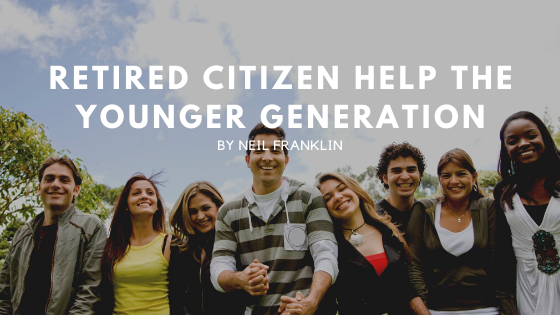
What Every Retired Citizen Can Do To Help The Younger Generation
I’m a 1960’s child, born in 1964 and although I don’t remember much of the 6 years I spent in that decade, I do know that it was a period of disruption.

My parents had grown up during the war years and those years stood for austerity, for fear and certainly provided for uncertain times.
When we entered the 1960’s and faced what was arguably the most dangerous potential confrontation that the world had faced since the end of the second world war, the Cuban missile crisis, people had had enough and they began to rebel.
We had already been in a war with Korea and the US was still in a war with Vietnam and now we were on the brink of the “horror of all horrors — a nuclear war.
The 1960s as I have said, saw a move toward liberation — music (The Beatles), hairstyles (Vidal Sassoon) and the invention of the mini skirt, totally revitalized the stiff mentality that was presiding over the world until that point and people loved it — it was not called the “swinging sixties” for nothing.
As we moved through the 1970s, 80,s, 90s, and into the new Millenium we saw many changes.
Now we had one period where things were going to change, disrupt and create a whole new set of opportunities, slash physical boundaries and change the way we communicate — the development of Internet technology and the communication systems around it.
The 1960s and the similarities with today
We are in a similar environment to the 1960s today.
People are demanding change and to a degree, they are rebelling.
They don’t want the traditional 9-to-5 and they want to work on their terms — just as anyone would have laughed at the fact that women’s hairstyles in the 1950s would dramatically change until Vidal Sassoon came along and smashed the boundaries of hairdressing, the people of today will do the same with regard to the way we work and the way we live our lives.
Think of the disruption that Internet-enabled shopping has caused to the high street.
Think of how people can now work from the comfort of their own laptops and from any location digital nomads working online. (Top 10 tips to become a digital nomad in 2020)
Look at the development and adoption of cryptocurrencies and especially Bitcoin.
Look at the looming technologies such as blockchain.
I have written an article — “The future of money: the illusion and what you must know about cryptocurrency,” that goes into more detail.
Just like the swinging sixties, we are moving from a centralized “stiff” world to a decentralized one of more freedom, wherein simple terms, people are starting to dictate their own terms with regard to living their lives.
The younger generation

Millennials and Generation Z, have no concept of the period I commenced with above and the advantage they have is a huge understanding and the adoption of technology.
But what about social skills and Emotional Intelligence (EQ)?

The younger generation will face a stark reality in the future and at that is only my opinion of course…but although they have a great deal of affinity with technology and will be the front-runners of future technology jobs, there will be another side of the coin to consider.
EQ will power creativity, empathy and the ability to become self-aware, which will be the key component of building human capital over the coming years.
Automation, Artificial Intelligence (AI), and associated technologies will no doubt be the drivers of future economies, but until we really face the concept of a totally machine dominated environment, we will need people with highly developed EQ skills to build the teams, services and engage with the consumers who will benefit from the outcomes of such technology.
The younger generation will certainly not have faced the same social, economic and geopolitical situations as us “oldies,” and that in some ways creates the problem of being able to handle certain situations emotionally.
I know with my own children that I am trying to prepare them for the world and years they have ahead of them…and it is a tough challenge.
Whilst technology will not go backward, certain styles, trends and I am sure other things will make a comeback — that is why on many occasions, my children come to me with songs they like only to get my rely:
“I heard it the first time round and in some cases, the second.”
How can the older generation help?
In simple terms, we can help the younger generations understand emotional issues and their impact.
Most of the older generation have a balance of EQ and Intelligence Quotient (IQ) in favor of EQ simply because we have faced so many more issues that have affected our lives as well as learning through the educational system.
Seth Godin talks about being a lynchpin and I have also written my own thoughts on becoming a lynchpin in the world today in this article titled, “How to become a lynchpin at work and be the best employee.”
The whole idea of being “invaluable” to an organization will require a huge degree of EQ and you can learn more about EQ from people who were using and developing it to a very high standard in some cases, simply because they had to and without knowing the definition of it that we have today.
So my message to everyone nearing retirement and to those who are retired — get your knowledge out there and don’t worry how important or unimportant you think it is, someone will benefit from it.
The easiest way to do this is to get online with your own personal blog and then deliver your knowledge in a manner that is most comfortable with you.
Read my article about: Learning digital skills, here!
Get in touch with Fernando Raymond and he is helping so many people to go out there and tell their own stories in the hope that it helps and inspires others — I don’t know anyone in his field that is making so much effort to do the same!
After all, it was Fernando who inspired me to do exactly that!
– Neil Franklin

